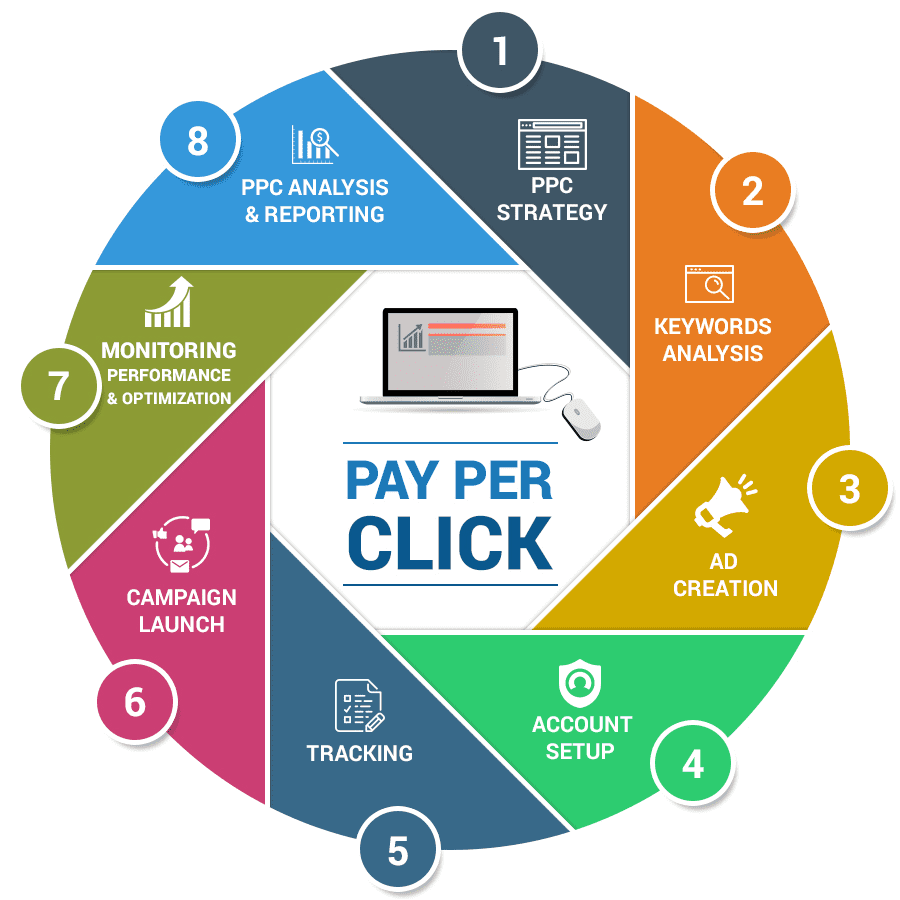What is PPC?
PPC means pay-per-click, a model of web marketing in which marketers pay a fee each time their ads are clicked. Basically, it’s a way of acquiring visits to your website, as opposed to attempting to “earn” those visits organically.
Search engine advertising is just one of one of the most popular forms of Pay Per Click. It allows advertisers to bid for ad positioning in an online search engine’s sponsored web links when a person searches on a search phrase that relates to their business offering. For instance, if we bid on the key phrase “PPC software program,” our advertisement might appear in the leading spot on the Google results page.
Every time our advertisement is clicked, sending a site visitor to our website, we need to pay the search engine a small charge. When PPC is functioning appropriately, the charge is minor, since the checkout deserves more than what you spend for it. Put simply, if we pay £3 for a click, but it results in a £300 sale, we have actually made a significant revenue.
A great deal goes into constructing a winning Pay Per Click campaign: from looking into as well as choosing the appropriate keywords to arranging those key phrases into well-organized campaigns and ad groups, to setting up Pay Per Click landing pages that are enhanced for conversions. Online search engines award marketers who can produce appropriate, intelligently targeted pay-per-click projects by billing them much less for ad clicks. If your advertisements, as well as landing web pages served, are satisfying to customers, Google bills you much less per click, leading to greater profits for your company.

What are Google Advertisements?
Google Ads (formerly called Google AdWords) is the most prominent PPC marketing system worldwide. The Google Ads platform allows businesses to create ads that show up on Google’s internet search engine and various other Google properties.
Google Ads operates on a pay-per-click basis, in which customers bid on key phrases and pay for each click on their ads. Whenever a search is initiated, Google explores the pool of Ads and selects a collection of good quality ads to show up on the search engine result page. The “victors” are selected based upon a mix of aspects, consisting of the quality as well as the relevance of their keywords and advertising campaign, as well as the size of their keyword bids.
Much more specifically, who appears on the search results is based on the advertiser’s Ad Rank, a metric determined by two key factors: –
- CPC Bid (the highest possible amount a marketer agrees to spend) as well as
- Quality Rating (a value that considers your click-through rate, price, relevance, as well as landing page quality). This system allows winning advertisers to get to potential clients at an expense that fits their budget plan.
It’s essentially a sort of public auction.
While several aspects figure out how successful your Pay Per Click advertising campaign will be, you can attain a great deal by concentrating on: –
Key Phrase Significance – Crafting relevant PPC key words checklists, limited key words groups, as well as appropriate advertisement text.
Landing Page Quality – Producing optimised landing pages with convincing, pertinent web content, and a clear call-to-action, customised to certain search queries.
Quality Score – High Quality Score is Google’s ranking of the top quality as well as importance of your search phrases, landing pages, and PPC campaigns. Marketers with much better High-quality Ratings get more ad clicks at reduced expenses.
Creative – Inviting ad copy is crucial if you’re advertising on the display network
PPC Keyword Phrase Research
Keyword research for PPC can be unbelievably time-consuming, yet it is also unbelievably crucial. Your whole Pay Per Click campaign is built around keywords. The most successful Google Ads advertisers continuously grow and refine their Pay Per Click keyword checklist. If you just do keyword research when you create your very first project, you are losing out on hundreds of beneficial, long-tail, affordable, and extremely pertinent keywords that can be driving website traffic to your site.

